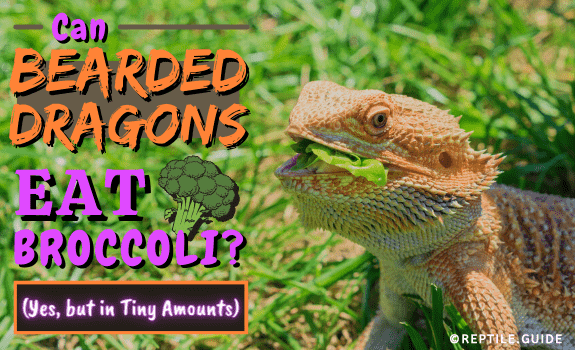Bearded dragons can eat broccoli, but only one small floret and only around once a month.
Broccoli has the wrong ratio of calcium to phosphorus, which is an important element in any bearded dragon’s diet.
Oxalic acid also affects bearded dragons negatively, and broccoli contains quite a bit of it.
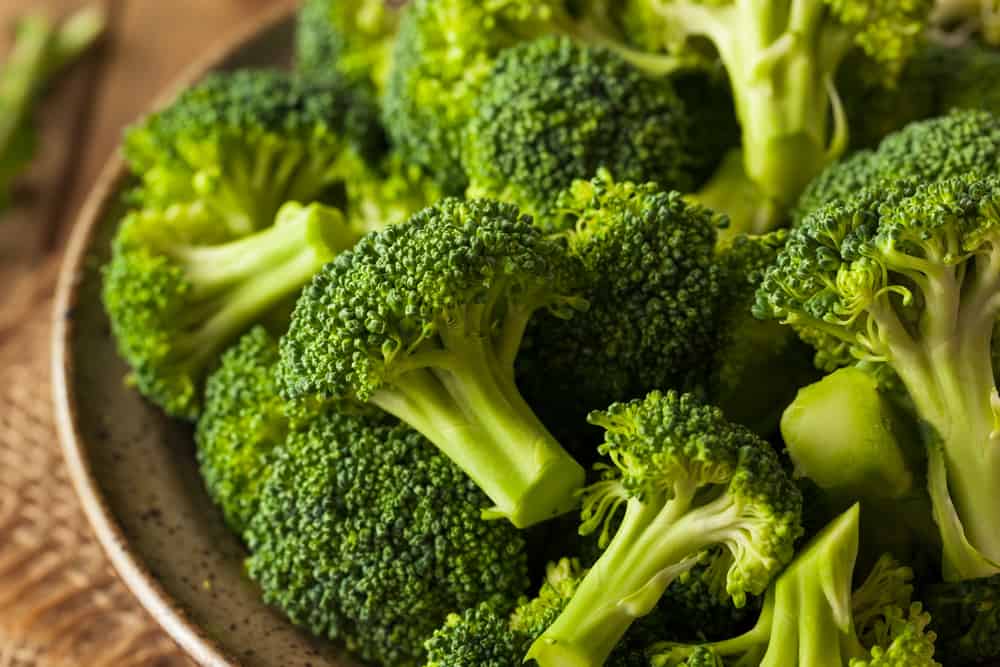
In This Article
Nutritional Value of Broccoli
In appropriate amounts, broccoli offers many benefits for your bearded dragon.
According to the FDA, 100 grams of raw broccoli contains:
- 2.57 grams of protein
- 46 milligrams of calcium
- 303 milligrams of potassium
- 67 milligrams of phosphorus
- 21 milligrams of magnesium
- 0.191 milligrams of Vitamin B-6
- 8 micrograms of Vitamin A
- 93 micrograms of beta-carotene
- 91.3 milligrams of Vitamin C
- 102 micrograms of Vitamin K
- 1.4 grams of sugar
Bearded dragons need a 2:1 ratio of calcium to phosphorus. As you can see, raw broccoli has almost the reverse.
At the same time, it offers many trace vitamins and nutrients that are healthy.
How to Feed Broccoli to Your Bearded Dragon
When feeding your bearded dragon broccoli, presenting food the right way can make a huge difference.
Here’s how to prepare your bearded dragon’s broccoli:
- Cut one small floret of raw broccoli from the head, or remove it from the packet (if using pre-cut broccoli). Anything more than a floret is too much broccoli.
- Wash the floret and cut it into smaller pieces.
- Place the floret in the bearded dragon’s food bowl.
- Add pieces of other veggies like bell peppers, beet greens, swiss chard, or mustard greens.
Offering a varied diet helps to counteract the negative effects of giving a bearded dragon broccoli. - Mix the food well, and sprinkle a generous helping of calcium dust on top.
- Present the food to your bearded dragon.
How Often Can a Bearded Dragon Eat Broccoli?
A bearded dragon can have broccoli once a month.
You should only feed bearded dragons one small floret. Due to the high oxalic acid content and wrong calcium ratio, larger pieces would be too much broccoli.
Can Baby Bearded Dragons Eat Broccoli?
While you can give your baby bearded dragon broccoli, we wouldn’t recommend it.
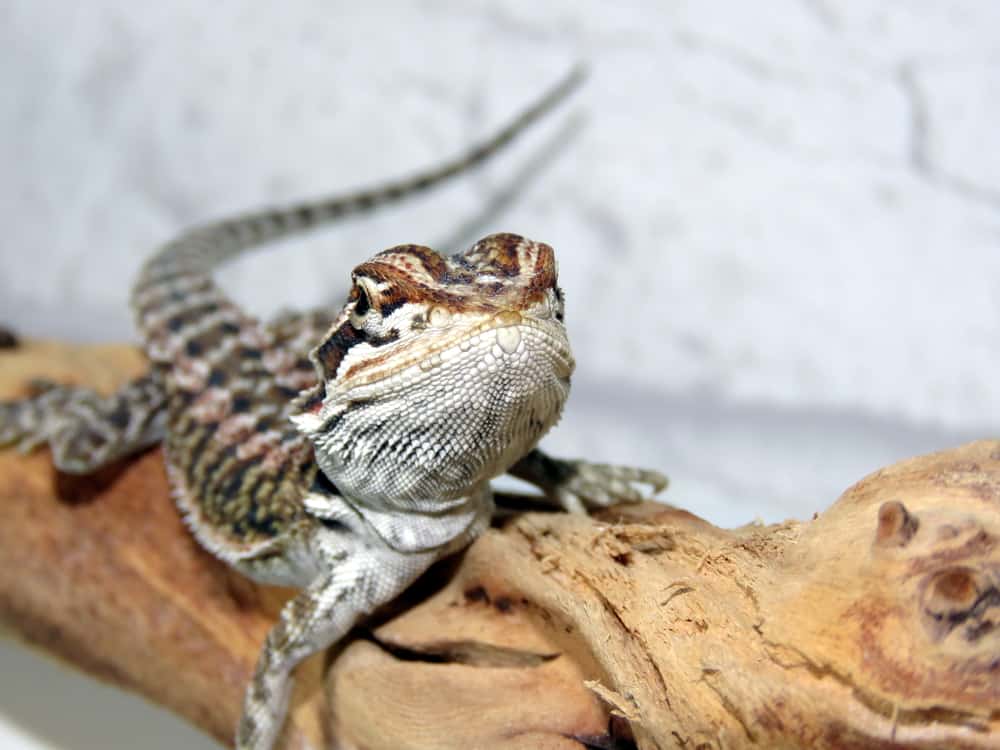
If you gave a baby beardie raw broccoli, it would have to be a tiny piece.
There are many more valuable foods that you can feed your baby beardie. From collard greens to mustard greens and green beans, many healthy options exist that won’t be harmful.
Can Bearded Dragons Eat Broccoli Raw?
Bearded dragons eat broccoli raw, and it’s the best way to give it to them.
Cooking broccoli removes temperature-sensitive nutrients. Freezing broccoli has the same effect.
If you plan on feeding broccoli to your bearded dragon, we recommend raw broccoli florets.
Can Bearded Dragons Eat Broccoli Leaves?
Bearded dragons can eat broccoli leaves.
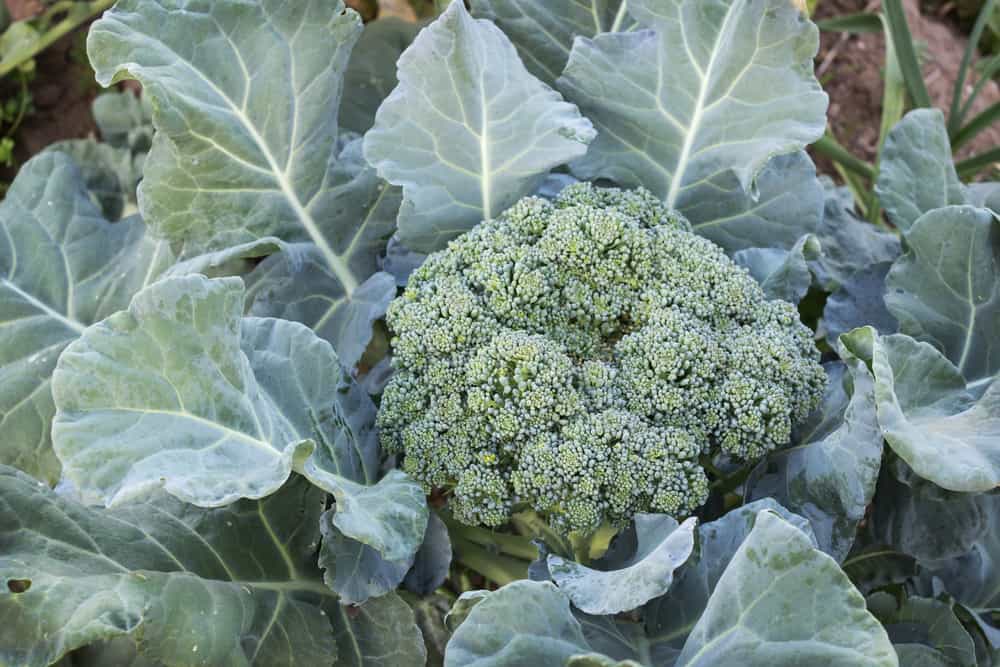
Ensure that you shred the broccoli leaves so your bearded dragon can eat and digest them easily.
As with most plants in the cabbage family (Brassicaceae), you should only feed the leaves to your bearded dragon in small amounts.
This family of plants is goitrogenic. They contain chemicals that affect thyroid function. To keep your bearded dragons healthy, it’s best not to overfeed Brassicas.
Other examples of plants in this family include:
- Cauliflower
- Brussel Sprouts
- Cabbage
- Chinese Cabbage
- Mustards
- Collard Greens
- Kale
- Turnips
- Radishes
While all of these plants can be beneficial, you often need to limit your beardie’s intake of them. Research each of them individually before feeding, so you know the risks and benefits.
It’s also a good idea to shred them to prevent them from becoming choking hazards.
Can Bearded Dragons Eat Broccoli Sprouts?
You should NEVER feed your bearded dragon broccoli sprouts.
All plants in this family are goitrogenic, containing chemicals that affect thyroid function. The sprouts have even higher amounts of these chemicals.
Broccoli sprouts are also rich in oxalic acid which negatively affects calcium absorption.
Can Bearded Dragons Eat Broccoli Stems?
Your bearded dragon can eat broccoli stems.
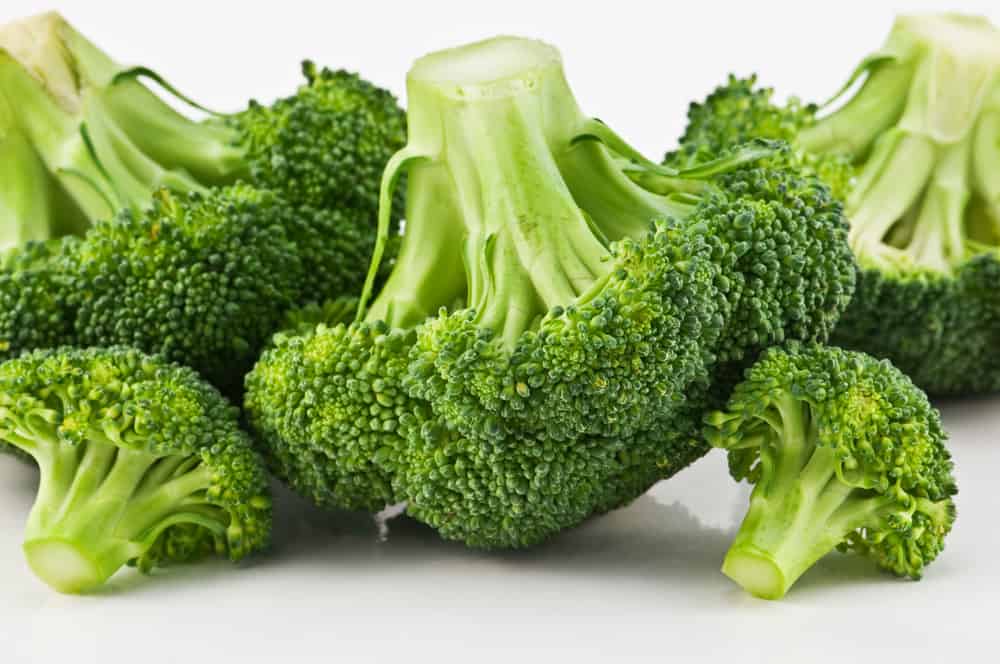
As with any other part of the broccoli plant, ensure that the stem is shredded into small pieces.
Only feed your bearded dragon a piece of stem about the size of one small broccoli floret.
If you give your bearded dragon broccoli stem, you shouldn’t feed it any more broccoli for the rest of the month.
Can Bearded Dragons Eat Broccoli Florets?
Your bearded dragon can eat florets of broccoli.
If you’re going to feed your beardie broccoli, the florets are the easiest parts to feed to your pet.
Due to the high contents of oxalic acid and goitrogens, only feed your pet beardie one small floret every month.
Pros of Feeding Broccoli to Your Bearded Dragon
Despite the potential dangers, there are many advantages to letting your bearded dragon eat broccoli. Let’s look at a couple.
High Protein and Fiber Content
Bearded dragons require a high amount of protein in their diet when they’re young. As they grow, they still need protein, but not as much of it.
Broccoli contains approximately 2.5% percent protein, which can go a long way towards meeting the lizard’s protein requirement while it’s eating vegetables.
Fiber is an essential part of most reptiles’ diet, as it keeps the digestive system operating well.
Around 2.4% of a portion of broccoli consists of fiber. Broccoli can be a valuable addition to your beardie’s diet, and help maintain proper digestive function.
Contains Many Trace Nutrients and Vitamins
For human consumption, many people tote broccoli as the vegetable for ingesting calcium. For bearded dragons, the calcium content is lower than you’d like.
However, this food makes up for it with a myriad of other vitamins and minerals.
When you let your bearded dragon eat broccoli, it consumes:
- Iron
- Calcium
- Vitamin A
- Vitamin K
- Vitamin C
- Potassium
- Magnesium
- Phosphorus
- Vitamin B-6
Many of these elements occur only in small amounts in your bearded dragon’s diet. While your pet doesn’t need all of them in high amounts, they require a certain percentage.
Beta-carotene is one of the essential elements found in broccoli. It plays a role in helping to absorb calcium into the bloodstream.
If your beardie gets enough Beta-carotene orally, this nutrient will brighten the lizard’s color over time.
High Water Content
In most cases, you don’t want to feed your beardie foods that are too high in water.
They only eat once a day, and you want to ensure that meal gives them the largest possible amount of nutrients.
However, in some cases, it can be beneficial. If you have a dehydrated beardie, for instance, water-rich foods can help get them back in shape.
Broccoli consists of around 90% water, making it a great candidate for hydration purposes along with watermelon, cucumber, spinach, and celery.
Low Sugar Content
The flowers and fruits of most plants contain high amounts of sugars. In the wild, beardies consume few sugars since they mostly feed on insects and plant leaves.
One of the advantages of broccoli for bearded dragons is that it’s low in sugars.
This plant contains a little over 1% of sugar which means that it won’t negatively affect your pet (with sugar, at least).
Cons of Feeding Broccoli to Your Bearded Dragon
When you’re feeding your bearded dragon broccoli, there are several cons to consider. You can counteract some of them, but not all.
The Wrong Calcium To Phosphorus Ratio
When trying to keep a bearded dragon healthy, the ratio of calcium to phosphorus is essential.
Many types of flowers and fruits (including broccoli) have a high amount of Phosphorus and a low amount of Calcium. Bearded dragons need the opposite ratio to stay healthy.
Phosphorus is needed in certain amounts to help maintain immunity and keep the thyroid running properly. However, in large amounts, it can be toxic.
Excessive phosphorus binds to calcium and prevents your beardie’s body from absorbing it.
If it happens now and then it’s not a major problem, but a beardie’s body may store phosphorus and other substances in its tissues.
If the bearded dragon builds up enough of a phosphorus store or just eats more phosphorus than calcium, it can lead to serious health problems.
Using broccoli for bearded dragons regularly can lead to metabolic bone disease (MBD) if you feed it too often.
Animals with MBD have weak bones since their bodies don’t have enough calcium to produce a strong skeleton.
Use calcium supplements to help balance the ratio when you feed this vegetable to your pet.
High Amounts of Oxalates and Goitrogens
Like most plants in the Brassica family, broccoli contains several chemicals that are harmful in large amounts.
Oxalates are one of the major culprits. These acids bind to calcium and prevent the beardie’s body from absorbing it.
Broccoli’s oxalate content is lower than that of some of its relatives. However, it has extreme amounts of goitrogens.
Goitrogenic substances prevent a bearded dragon’s thyroid from working properly. Of course, giving these foods to your lizard often won’t lead to a healthy animal.
Can Bearded Dragons Eat Cauliflower?
You can feed your bearded dragons cauliflower.
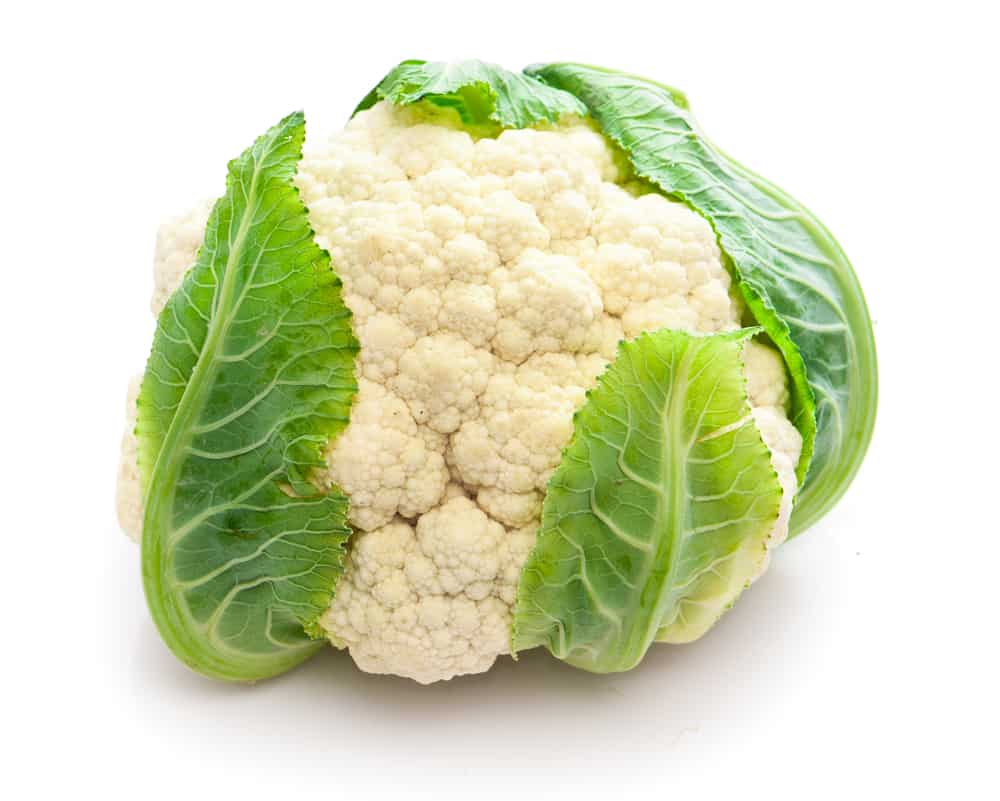
However, as with broccoli, collard greens, and other brassicas, it’s best to limit how much of it your pet eats.
We recommend giving your bearded dragon similar amounts of cauliflower as you would broccoli. Around one small floret of cauliflower a month is safe for your pet.
Keeping Your Bearded Dragon’s Diet Balanced
Bearded dragons have a fairly specific set of nutritional needs. The calcium to phosphorus ratio, in particular, is of optimal importance.
The best way to meet all your beardie’s needs is to feed it a wide variety of foods.
Young bearded dragons should eat a diet that consists of 80% live food, and 20% of vegetable matter. Adult dragons need 20% live food and 80% vegetable matter.
There are many worthwhile live food options on the market. These include:
- Crickets
- Mealworms
- Earthworms
- Superworms
- Black soldier fly larvae
Pro Tip: Don’t feed too many mealworms to your dragon. They have a higher fat content than the other insects and can lead to obesity. Avoid feeding waxworms as a whole.
Whether it’s for an adult or baby lizard, fruit should be the least prominent food group.
For a baby bearded dragon, fruits can make up about 5% of the diet. For adults, they can constitute 15-20%.
Many types of fruit can be beneficial if fed in moderate amounts. They include:
- Pears
- Apples
- Melons
- Grapes
- Cherries
- Peaches
- Bananas
- Watermelon
- Blackberries
- Strawberries
Fruits to avoid include:
- Avocados
- Cucumbers
- Pineapples
- Oranges and other citrus
As we mentioned earlier, a beardie’s natural diet contains few sugars. Most fruits contain high amounts of sugar and the wrong ratio of Calcium to Phosphorus.
You want to avoid overfeeding fruit because it can lead to obesity and, in some cases, Metabolic Bone Disease.
Vegetables should be the largest portion of an adult bearded dragon’s diet.
Many types are good for beardies, though some require special preparation or you can only feed them in small amounts:
- Kale
- Carrots
- Celery
- Swiss chard
- Mustards
- Alfalfa
- Bok choy
- Parsley
- Clover
- Watercress
- Cabbage
- Kohlrabi
- Cauliflower
- Brussel Sprouts
- Chinese Cabbage
- Turnips and Radishes
Check out our bearded dragon feeding guide for detailed instructions on dietary proportions and how to keep your dragon’s diet healthy.
The best diet for these animals contains all three elements, in appropriate proportions. Don’t forget to use calcium powder to keep your pet’s diet balanced.
We hope you’ve enjoyed this article about bearded dragons and broccoli. Be sure to check out our related articles to learn more about these creatures.
If you’re new to bearded dragons, you might also want to take a look at our comprehensive care guide.
What’s your beardie’s favorite veggie? Let us know in the comments.
